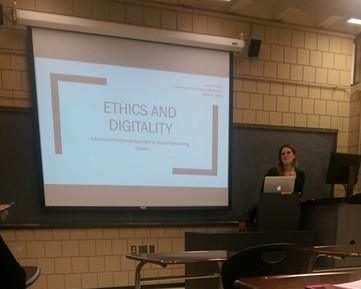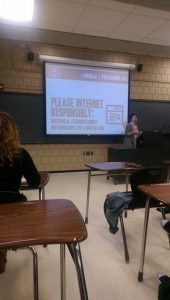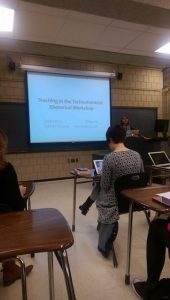Presenters
Kristin Ravel, University of Wisconsin-Milwaukee
Allegra W. Smith, Purdue University
Kristin Prins, Cal Poly Pomona
Review
 Speaking to a full classroom following Thursday morning’s keynotes, the three presenters on “A.3: Mobilizing Digital Feminist Rhetorical Theory and Practice” raised important questions about resistance, reflexivity and reframing our thinking about feminist practices in technological spaces. Adhering to Bawarshi’s call earlier that morning to catalog #WatsCon16, Allegra’s Storify recap of the panel archives the audience’s Twitter discussion as it unfolded and amplifies the themes of self-care, reflection, and rhetorical listening that were apparent throughout the panel’s presentations and discussion. (As of 2/2/2018 the Storify has been archived and shared at the bottom of this post).
Speaking to a full classroom following Thursday morning’s keynotes, the three presenters on “A.3: Mobilizing Digital Feminist Rhetorical Theory and Practice” raised important questions about resistance, reflexivity and reframing our thinking about feminist practices in technological spaces. Adhering to Bawarshi’s call earlier that morning to catalog #WatsCon16, Allegra’s Storify recap of the panel archives the audience’s Twitter discussion as it unfolded and amplifies the themes of self-care, reflection, and rhetorical listening that were apparent throughout the panel’s presentations and discussion. (As of 2/2/2018 the Storify has been archived and shared at the bottom of this post).

Kristin Ravel’s (@kristn_ravel) “Ethics and Digitality: A Feminist Rhetorical Approach to Social Networking Spaces” asked audience members to re-think how technologies mediate our engagement with them. Ravel maintains that the curation of information on social media shapes how we interact with it—the information calls for an immediate response without giving the reader the needed time and space to consider the messages presented. To engage with the ethical implications of social media curation, Ravel brings together Sonja Foss’s “invitational rhetoric” (characterized by listening with intent and thinking through cultural logics) and Krista Ratcliffe’s “rhetorical listening” (characterized by seeing all beings as equal, respecting agency, and recognizing that each person has a singular perspective). For Ravel, these theories allow us to question social media interfaces and remind us that self-care and understanding are more important than immediate response (particularly with misogynist or violent content and comments).
To get her students to think further about social media content and our responses to it, Ravel asks students to keep automation journals (tracking automated content and questioning the values and cultural logics associated with it). She also uses Eli Pariser’s “Filter Bubble” Ted Talk and Safiya U. Noble’s “Missed Connections” article for Bitch Magazine alongside multiple political websites (e.g., Blue Feed, Red Feed, Politifact, Snopes, and 180report) to get students to pay attention to what’s trending in different feeds. This wide examination of curated content opens up discussion of how information becomes viral and how information is targeted towards certain groups. Ravel’s presentation ended with an imperative reminder that our reception and understanding of content is shaped by the medium used and that we need to value our emotional labor as precious (i.e., we don’t always need to respond).
 Following up on the themes of self-care in digital spaces, Allegra Smith’s (@argella) “Please Internet Responsibly: Rhetorical Feminist Methodologies for a Digital Age” illustrated the ethical challenges and imperatives of performing technological feminist research. Adapting Shulamit Reinharz’s Feminist Methods for Social Research for digital scholars, Smith outlined four technofeminist methodological tactics:
Following up on the themes of self-care in digital spaces, Allegra Smith’s (@argella) “Please Internet Responsibly: Rhetorical Feminist Methodologies for a Digital Age” illustrated the ethical challenges and imperatives of performing technological feminist research. Adapting Shulamit Reinharz’s Feminist Methods for Social Research for digital scholars, Smith outlined four technofeminist methodological tactics:
- (re)presentation of marginal lives, communities, and perspectives;
- (re)valuing digital stories and practitioner theory;
- (re)ciprocity through participatory design and data coding;
- (re)flexivity that includes mapping positionalities and engaging in embodied interpretations.
With these tactics, knowledge is distributed and the participant is actively involved in the data’s interpretation and meaning-making. Smith asserts: “Instead of capturing others’ voices, we should work to amplify them.” The importance of these technofeminist tactics are that they position the participant as an integral contributor to the research process and exemplify the ways that our research practices are embodied. These tactics decentralize power relations and highlight user-centeredness.
Smith demonstrated the importance of these tenants with her own Master’s thesis studying the male gaze in pornography. Smith’s committee encouraged her to engage in self-care by making use of an “affective pass” of her data—speaking aloud on video and tracking her reactions to what she witnessed on the screen. This prompted her to think through the how and why of her responses, situating her own body and emotions as a site of meaning-making. The affective pass, in combination with a reflective research journal, allowed Smith to map her own position, reflect on her research practices, and listen rhetorically to her embodied responses to what she was viewing on the screen. The practices that Smith uses herself are ones that can extend to other research contexts. Reflecting on research, checking in with participants, amplifying their voices, and engaging in participatory design are some of the ways that our research practices can benefit others.
 Kristin Prins’ “Teaching in the Technofeminist Rhetorical Workshop” (@kkprins) begins with a rant: too many teachers complain about technology as being beyond our control, yet we don’t accept that attitude from our students. Problems with technology are not something we accept from them, but an attitude we take too often ourselves. Secretly, she maintains, we hope that our students don’t see our own technological incompetency. This attitude we have towards our own technological understanding is problematic as we (unintentionally) model that approach when we teach.
Kristin Prins’ “Teaching in the Technofeminist Rhetorical Workshop” (@kkprins) begins with a rant: too many teachers complain about technology as being beyond our control, yet we don’t accept that attitude from our students. Problems with technology are not something we accept from them, but an attitude we take too often ourselves. Secretly, she maintains, we hope that our students don’t see our own technological incompetency. This attitude we have towards our own technological understanding is problematic as we (unintentionally) model that approach when we teach.
Using Richard and Cindy Selfe’s “Politics of the Interface” (the interface is not innocent), Stuart Selber’s Multiliteracies for a Digital Age (arguing for functional, critical, and rhetorical literacies), and Judy Wajcman’s Technofeminism (innovation comes through cultural and symbolic meanings from our interactions/relations), Prins invites students to engage with technologies by re-purposing and misusing them—demonstrating how technologies are constructed and reconstructed by interacting with them. Students have an opportunity to work both against and with digital technologies. This stance is a technofeminist one as it views technologies as malleable through our interactions with them.
Further adopting a technofeminist approach to teaching, Prins structures her composition classroom as a “Writing Studio” where students have time in class to experiment, play, write, and produce. Students move between stations where they can work with different aspects of technologies. They are encouraged to encounter and work through their technological difficulties themselves i![]() n this space as instructors model what we would do when we have a problem with technology (i.e., Google it) using “application” + “what you’re trying to do” on a Google search. The power structures in this space are distributed and students learn from their peers. By reshaping our attitude towards digital technologies, Prins wishes to normalize that technological competence does not equal comprehensive expertise and that our relationship with technology is a continual navigation. Part of being competent with technology is learning how to figure things out.
n this space as instructors model what we would do when we have a problem with technology (i.e., Google it) using “application” + “what you’re trying to do” on a Google search. The power structures in this space are distributed and students learn from their peers. By reshaping our attitude towards digital technologies, Prins wishes to normalize that technological competence does not equal comprehensive expertise and that our relationship with technology is a continual navigation. Part of being competent with technology is learning how to figure things out.
Through the discussion and all three presentations I saw important overlaps concerning reflexivity, self-care, and modeling feminist practices (both as researchers and teachers). A question during the discussion that stuck out to me as being particularly relevant to the overlaps between the presenters (and important for feminist scholars) was: “What are some suggestions for encouraging self-care in spaces that require our attention?” Smith mentioned the importance of research memos and journals that allow the researcher to refine their thinking and make connections with people. She further adds that establishing a community of care through mentoring networks (both formal and informal) as being key. To that, Ravel adds that it’s important to realize that we don’t always have to respond. It’s important for feminist scholars to engage in self-care and protect themselves first and foremost.
Archived Storify:
Kristin Ravel, @kristen_ravel (PhD Candidate, UW-Milwaukee):
“Ethics and Digitality: A Feminist Rhetorical Approach to Social Networking Spaces”
Wysocki (2004) asserts that it is not enough for students to produce digital texts; they must become alert to how and why they use these materials to compose and what effects those materials have. Yet too often reflection is skirted in social networking spaces (SNSs), and instead of imagining SNSs’ social and political effects, users view them as neutral tools for communication. How may we develop a rhetorical pedagogy that encourages more critically aware and responsible digital citizens—even while social media encourages users to share information as quickly and frequently as possible? To answer this, Kristin draws on the feminist work of compositionists Ratcliffe (2005), Dingo (2012), and Foss and Griffin (1995) to develop a methodology of feminist digital responsibility focused on accountability, recognizing difference, and models of listening.
Wonderful, empathetic @kristin_ravel calling for ethical digital practice at #WatsCon16 #a3 pic.twitter.com/cyVEcda1ab
— Dr. Allegra Smith (@argella) October 20, 2016
https://twitter.com/MeganEatman/status/789122106839605248
Student do not view social media as value neutral. They recognize it as a flawed but necessary technology. (@kristin_ravel #WatsCon16 #a3)
— Dr. Allegra Smith (@argella) October 20, 2016
Literate acts taking place on social media should be seen as composing practices worthy of scholarly attention @kristin_ravel #WatsCon16 #a3
— Dr. Allegra Smith (@argella) October 20, 2016
Rhetors, audiences have different expectations & responsibilities, but @kristin_ravel identifies definite ethical overlaps #WatsCon16 #a3
— Dr. Allegra Smith (@argella) October 20, 2016
"what are feminist pedagogical goals for considering medium?" @kristin_ravel #a3 #watscon16
— Kristin Arola (@kristinarola) October 20, 2016
"Listen not FOR intent, but WITH intent." — @kristin_ravel #WatsCon16 #a3
— Dr. Allegra Smith (@argella) October 20, 2016
Communication is an ongoing process—not a specific, instrumental or determinate end point (@kristin_ravel #WatsCon16 #a3)
— Dr. Allegra Smith (@argella) October 20, 2016
Rhetorical affordances & ethical consequences of participatory, user-driven platforms should be considered (@kristin_ravel #WatsCon16 #a3)
— Dr. Allegra Smith (@argella) October 20, 2016
Online comments sections take the remarks of your misogynistic uncle and magnify, multiply them (@kristin_ravel #WatsCon16 #a3)
— Dr. Allegra Smith (@argella) October 20, 2016
@kristin_ravel describes teaching automation journals: students record what's automated and reflect on their cultural logics #WatsCon16 #a3
— Stacey Pigg (@pidoubleg) October 20, 2016
cool activity: having students track the daily automation they face @kristin_ravel #a3 #watscon16
— Kristin Arola (@kristinarola) October 20, 2016
student activity: looking at automated content on social media w rhetorical listening, cultural logics in mind-@kristin_ravel #WatsCon16 #a3
— erin “updated w a rustic feel” brock carlson, phd (@brinerock) October 20, 2016
Red Feed, Blue Feed & Politifact are two ways to visibilize students' filter bubbles, which @kristin_ravel cites in #WatsCon16 #a3
— Dr. Allegra Smith (@argella) October 20, 2016
re self-care, internet harassment, & response: "too often the interface is asking us to [respond]" @kristin_ravel #WatsCon16 #a3
— Dustin Edwards (@edwardsdusty) October 20, 2016
https://twitter.com/MeganEatman/status/789137474094239744
Allegra W. Smith, @argella (PhD Student, Purdue):
“Please Internet Responsibly: Rhetorical Feminist Methodologies for a Digital Age”
Digital rhetoricians have noted the internet’s potential to reify systems of differential social power, or to dismantle these hegemonies. Consequently, internet research also carries with it the ability to reaffirm existing dominant rhetorical practices, or to recover and reinscribe communicative sites and practices that reflect previously othered forms of meaning-making and being.
One potential way to engage with the liberatory possibilities of digital interfaces is through feminist research methodologies. Feminist research practices, which begin their inquiry from marginal lives and experiences, provide a starting point for internet research that can mobilize knowledge across digital platforms, geographic locations, and even disciplinary boundaries. Focusing on the work of emerging and early-career scholars in the field of rhetoric and composition, Allegra highlights instances of such technofeminist research method(ologie)s as grounding work in the theory of practitioners, employing a positional framework, and engaging in participatory data coding.
calls our attention to Reinharz's 1992 Feminist Methods in Social Research, and suggest remixing it for digital work @argella #a3 #watscon16
— Kristin Arola (@kristinarola) October 20, 2016
https://twitter.com/MeganEatman/status/789125594680291328
.@argella describes how researchers *practice* feminist methodology, remixing Reinharz's _Feminist Methods_ for digital age #WatsCon16 #a3
— Stacey Pigg (@pidoubleg) October 20, 2016
#a3: @argella points to (re)presentation (re) valuting (re)ciprocity and (re)flexivity as technofeminist methodological tactics #watscon16
— erin “updated w a rustic feel” brock carlson, phd (@brinerock) October 20, 2016
